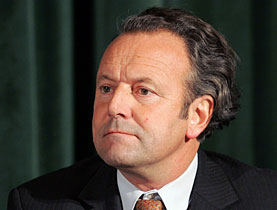Cautious welcome to banking secrecy move

There has been mixed reaction to the Swiss government's decision on Friday to cooperate on cases of international tax evasion to avoid being placed on a blacklist.
Facing possible sanctions by the Organisation for Economic Cooperation and Development (OECD), the cabinet decided to conform with the body’s standards.
Finance Minister Hans-Rudolf Merz made the announcement at a news conference.
The present distinction between fiscal fraud and fiscal evasion is to become obsolete, allowing the exchange of information with other countries in individual cases and based on legal requests.
“The government is ready to begin negotiations on revising double taxation agreements,” said Merz.
He added that banking secrecy would remain intact and that domestic bank clients would not be affected by the reform.
The Swiss Bankers Association said it supported the move. It also called for an end to all “improper international criticism of Switzerland and its legal system”.
The centre-right Radical Party and the Christian Democrats gave guarded approval.
The centre-left Social Democrats described the decision as a step in the right direction, although it came at the last minute and only under pressure from outside. The Greens said the government offer for concessions did not go far enough.
Betraying citizens
For its part, the rightwing Swiss People’s Party accused the government of “betraying citizens and bank clients” and giving in to “blackmail”. It announced it would defend the 75-year-old banking secrecy and force a nationwide vote.
Switzerland was not alone in making concessions. Austria, Luxembourg, Liechtenstein, Andorra as well as Singapore and Hong Kong announced similar moves to fend off a global crackdown on tax cheats.
The world’s major industrialised nations, known as the Group of 20, or G20, are to examine a proposal to blacklist Switzerland and other countries at a meeting in London at the beginning of April.
Swiss criminal law expert, Mark Pieth, told swissinfo that if the targeted nations including Switzerland had acted earlier, they probably would have got a better deal.
Pieth emphasised that the OECD accord “has been in place for some time”.
“The positive aspect of the agreement is that it is a multilateral solution,” Pieth said. “In other words, one does not have to negotiate separately with the Americans and Europeans.”
He also welcomed the fact that the solution presented avoids an automatic exchange of data, which had been demanded by Germany’s finance minister, Peer Steinbrück.
“A country can simply not ask for 50,000 files all at once. The procedure must be regulated on a case-by-case basis,” Pieth said.
On the international stage, Britain and France welcomed Friday’s announcements by Switzerland, Austria and Luxembourg to ease banking secrecy.
The British prime minister, Gordon Brown, said he hoped this was the beginning of the end for tax havens.
The EU is pleased by the Swiss decision according to a spokeswoman for the European Union taxation commissioner, Láslo Kóvács.

More
Direct democracy
Direct democracy
Merz said a revision of the double taxation accords could take several years and Swiss voters might have the final say in a referendum.
“What was decided today can’t be put into force overnight. Changes are subject to the rules of direct democracy,” he said.
Switzerland has double taxation deals with more than 70 countries and concluded an accord with the European Union on the taxation of savings as well as customs fraud, which will also be subject to new negotiations.
Merz said the government had drawn up a list of demands for talks, including improved market access for international financial services, fair transitional solutions, respect for administrative assistance procedures and an individual treatment of suspected cases of tax avoidance.
The finance minister ruled out a retroactive application of the amended treaties, saying alleged tax dodgers cannot be held accountable for old violations.
“You can say this amounts to an amnesty,” he said.
swissinfo
Banking secrecy is far from being a simply Swiss phenomenon. The European Commission is also targeting Belgium, Luxembourg and Austria. The Organisation for Economic Cooperation and Development also considers that Andorra and Monaco are non-cooperative tax havens, whereas Liechtenstein has cooperated with the EU since last year.
Banking secrecy is limited in Britain and the US but the two countries do have territories where it is less restrictive. Singapore has drafted plans in the general direction of the OECD. But when it comes to Hong Kong, China is deaf to EU demands for more transparency.
People wishing to dodge paying taxes on their assets can do so by three means: avoidance, evasion and fraud.
Avoidance is the legitimate means of structuring finances so they don’t fall under the scope of taxable assets. This can be done, for example, by setting up a trust fund or by changing country residence or nationality.
Evasion is the deliberate concealing the true state of assets from the tax authorities – in other words, lying about the extent of your assets. This is a civil offence in Switzerland and some other countries, such as Austria and Liechtenstein, but criminal in most states.
The main distinction between evasion and fraud is that the perpetrator tells lies on official documentation. Unless tax fraud can be proved, Swiss banks are not obliged to hand over details of client assets to investigators. In some cases this information is needed before fraud can be established in the first place.

In compliance with the JTI standards
More: SWI swissinfo.ch certified by the Journalism Trust Initiative











You can find an overview of ongoing debates with our journalists here . Please join us!
If you want to start a conversation about a topic raised in this article or want to report factual errors, email us at english@swissinfo.ch.